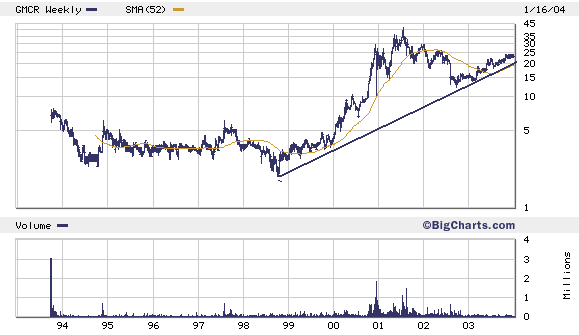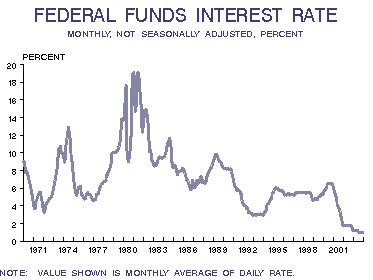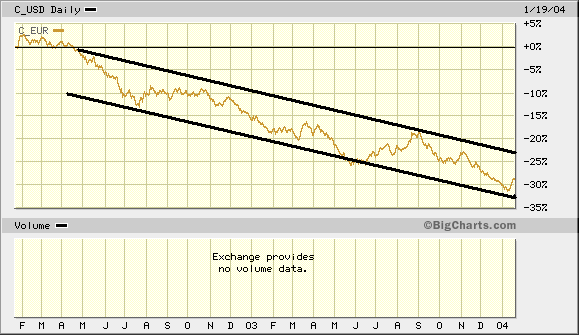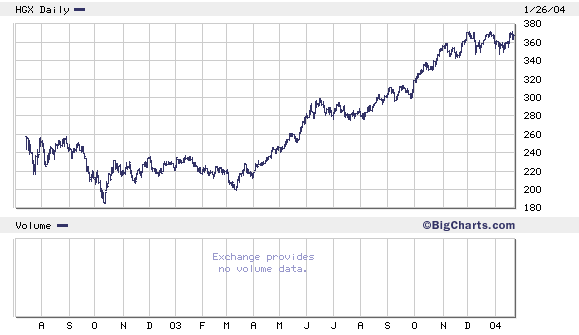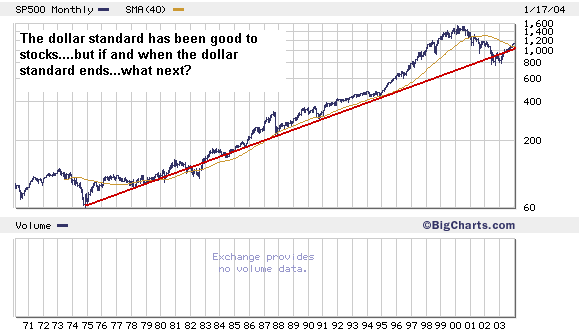On the Eurostar back to Paris this afternoon. But in the meantime, I've liberally excerpted from a fantastic article by Murray Rothbard that ran in a 1992 issue of Chronicles magazine. You can find the entire piece by clicking
here or going to http://www.mises.org/fullarticle.asp?control=1423&id=64 . Hat tip to the folks at prudentbear.com for linking to it.
I won't try to compete with Murray Rothbard by adding my own comments on the problem of debt, except to add that there's a moral element to the whole conversation as well. That is, debt is not, per se, morally repugnant. You can borrow money and pay it back. Lenders do a service making capital available for new projects.
But the public debt in America, and the culture of private debt it had encouraged, are disgraceful and shameful. It's not just that spending money borrowed from the future is irresponsible. It's just plain wrong to live above your means and pass the bill on to people who must live under the burden of paying off. But enough moralizing...on to Rothbard.
"Any melding of public debt into a private transaction must rest on the common but absurd notion that taxation is really "voluntary," and that whenever the government does anything, "we" are willingly doing it. This convenient myth was wittily and trenchantly disposed of by the great economist Joseph Schumpeter: "The theory which construes taxes on the analogy of club dues or of the purchases of, say, a doctor only proves how far removed this part of the social sciences is from scientific habits of mind." Morality and economic utility generally go hand in hand. Contrary to Alexander Hamilton, who spoke for a small but powerful clique of New York and Philadelphia public creditors, the national debt is not a "national blessing." The annual government deficit, plus the annual interest payment that keeps rising as the total debt accumulates, increasingly channels scarce and precious private savings into wasteful government boondoggles, which "crowd out" productive investments.
"Establishment economists, including Reaganomists, cleverly fudge the issue by arbitrarily labeling virtually all government spending as "investments," making it sound as if everything is fine and dandy because savings are being productively "invested." In reality, however, government spending only qualifies as "investment" in an Orwellian sense; government actually spends on behalf of the "consumer goods" and desires of bureaucrats, politicians, and their dependent client groups. Government spending, therefore, rather than being "investment," is consumer spending of a peculiarly wasteful and unproductive sort, since it is indulged not by producers but by a parasitic class that is living off, and increasingly weakening, the productive private sector. Thus, we see that statistics are not in the least "scientific" or "valuefree"; how data are classifiedÃ;whether, for example, government spending is "consumption" or "investment";depends upon the political philosophy and insights of the classifier.
"Deficits and a mounting debt, therefore, are a growing and intolerable burden on the society and economy, both because they raise the tax burden and increasingly drain resources from the productive to the parasitic, counterproductive, "public" sector. Moreover, whenever deficits are financed by expanding bank credit; in other words, by creating new money; matters become still worse, since credit inflation creates permanent and rising price inflation as well as waves of boombust "business cycles."
"It is for all these reasons that the Jeffersonians and Jacksonians (who, contrary to the myths of historians, were extraordinarily knowledgeable in economic and monetary theory) hated and reviled the public debt. Indeed, the national debt was paid off twice in American history, the first time by Thomas Jefferson and the second, and undoubtedly the last time, by Andrew Jackson.
"Unfortunately, paying off a national debt that will soon reach $4 trillion would quickly bankrupt the entire country. Think about the consequences of imposing new taxes of $4 trillion in the United States next year! Another way, and almost as devastating, a way to pay off the public debt would be to print $4 trillion of new money×either in paper dollars or by creating new bank credit. This method would be extraordinarily inflationary, and prices would quickly skyrocket, ruining all groups whose earnings did not increase to the same extent, and destroying the value of the dollar. But in essence this is what happens in countries that hyper-inflate, as Germany did in 1923, and in countless countries since, particularly the Third World. If a country inflates the currency to pay off its debt, prices will rise so that the dollars or marks or pesos the creditor receives are worth a lot less than the dollars or pesos they originally lent out. When an American purchased a 10,000 mark German bond in 1914, it was worth several thousand dollars; those 10,000 marks by late 1923 would not have been worth more than a stick of bubble gum. Inflation, then, is an underhanded and terribly destructive way of indirectly repudiating the "public debt"; destructive because it ruins the currency unit, which individuals and businesses depend upon for calculating all their economic decisions.
"I propose, then, a seemingly drastic but actually far less destructive way of paying off the public debt at a single blow: out-right debt repudiation. Consider this question: why should the poor, battered citizens of Russia or Poland or the other ex-Communist countries be bound by the debts contracted by their former Communist masters? In the Communist situation, the injustice is clear: that citizens struggling for freedom and for a free-market economy should be taxed to pay for debts contracted by the monstrous former ruling class. But this injustice only differs by degree from "normal" public debt. For, conversely, why should the Communist government of the Soviet Union have been bound by debts contracted by the Czarist government they hated and overthrew? And why should we, struggling American citizens of today, be bound by debts created by a past ruling elite who contracted these debts at our expense? One of the cogent arguments against paying blacks "reparations" for past slavery is that we, the living, were not slaveholders. Similarly, we the living did not contract for either the past or the present debts incurred by the politicians and bureaucrats in Washington.

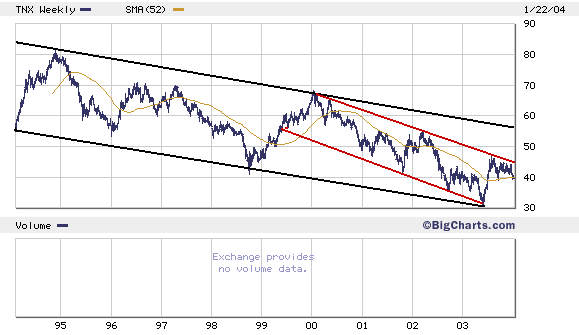 The chart shows you, (1) ten year rates are still in a long-term downward price channel, and (2) within the shorter term price channel since '99, rates have failed to move up and out of the channel toward 5%.
Does this mean rates are more likely to head lower than higher in the next few months? Strange as it sounds if you're as big a dollar bear as I am, the answer is yes. Dollar weakness is bad for stocks, but good for bonds. Of course the chart itself doesn't "say" all that.
But what it DOES indicate is that there is no real upward pressure on interest rates right now. Consumer price inflation--which the Fed has its eye on--is sufficiently tame to be worth ignoring. The only real inflation is going on in the housing and financial asset markets (some people calls this 'inflation.' I call it a bubble). This kind of inflation is a direct result of low interest rates...and furthermore...the Fed and everyone else seems to support it.
In other words, no one really wants rates to go higher. And so the dollar has decoupled from the bond market. The dollar may fall, but bond prices won't. In fact, they may go up, and yields may fall even further....Japan here we come...
The chart shows you, (1) ten year rates are still in a long-term downward price channel, and (2) within the shorter term price channel since '99, rates have failed to move up and out of the channel toward 5%.
Does this mean rates are more likely to head lower than higher in the next few months? Strange as it sounds if you're as big a dollar bear as I am, the answer is yes. Dollar weakness is bad for stocks, but good for bonds. Of course the chart itself doesn't "say" all that.
But what it DOES indicate is that there is no real upward pressure on interest rates right now. Consumer price inflation--which the Fed has its eye on--is sufficiently tame to be worth ignoring. The only real inflation is going on in the housing and financial asset markets (some people calls this 'inflation.' I call it a bubble). This kind of inflation is a direct result of low interest rates...and furthermore...the Fed and everyone else seems to support it.
In other words, no one really wants rates to go higher. And so the dollar has decoupled from the bond market. The dollar may fall, but bond prices won't. In fact, they may go up, and yields may fall even further....Japan here we come...
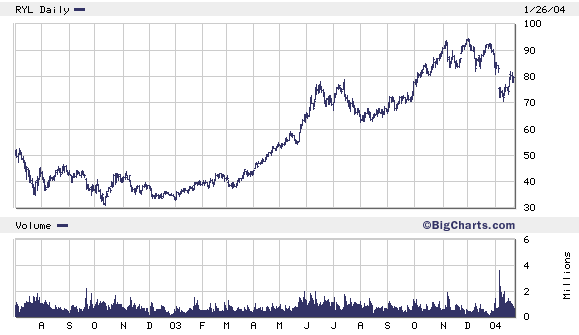 Then there's Centex (CTX). Centex was up 6.75% yesterday to close at $106.53. Its 52-week high is $113.08.
Then there's Centex (CTX). Centex was up 6.75% yesterday to close at $106.53. Its 52-week high is $113.08.
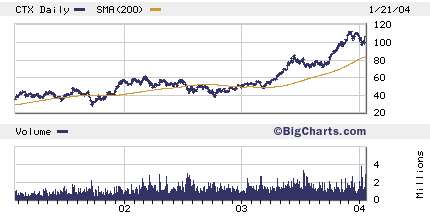 And finally, Beazer Homes (BZH). BZH was up 4.78% to close at $96.40--well off its 52-week high of $109.60.
And finally, Beazer Homes (BZH). BZH was up 4.78% to close at $96.40--well off its 52-week high of $109.60.
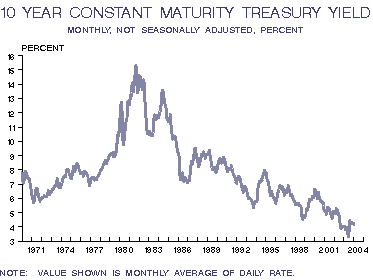
 Second, I would not constitute the chart below as a tip, but a start, and an observation. Green Mountain Coffee (GMCR) trades at 18 times forward earnings and just over 1 times sales. It's not conventionally cheap. But if coffee prices do rise...this is a nice looking chart to go along with them. Note, this chart uses weekly closes with a 52-week moving average. You can't see the MA for the last few months because it's right on the trend line I've added to the chart. And it's also moving up.
You also see that GMCR started moving up in 1999, well before coffee prices (apparently) bottomed. This makes sense. Green Mountain was paying less at the wholesale level and probably jacking up the prices on double espressos at the retail level...its margins getting ever wider.
And in fact, if you look at GMCR's net margins for the last six years, they confirm this exaclty. In '98, the net profit margin was 0.5%. In '99, it rocketed up to 3.4% as coffee prices made new lows in the fall. The recovery in coffee prices in early 2000 ate into net profit growth, but the company still posted a 5% net margin. And when 2001 coffee prices resumed their slump, the net margin topped out at 6.1%.
In the last two years however, margins have fallen. In 2002, the net margin was slightly lower at 6%. And through the first nine months of 2003, the net margin is 5.4%.
In fact, the more you look at it, coffee stocks are probably good shorts right now. The cost of their raw material is increasing. And the desire of people to pay top dollar for coffee has probably already peaked. Designer coffee is a luxury unemployed Americans will indulge in.
The most direct way to profit from rising coffee prices? Obviously the futures markets. Barring that, look for a country fund from a coffee producing country....more on that tomorrow.
Second, I would not constitute the chart below as a tip, but a start, and an observation. Green Mountain Coffee (GMCR) trades at 18 times forward earnings and just over 1 times sales. It's not conventionally cheap. But if coffee prices do rise...this is a nice looking chart to go along with them. Note, this chart uses weekly closes with a 52-week moving average. You can't see the MA for the last few months because it's right on the trend line I've added to the chart. And it's also moving up.
You also see that GMCR started moving up in 1999, well before coffee prices (apparently) bottomed. This makes sense. Green Mountain was paying less at the wholesale level and probably jacking up the prices on double espressos at the retail level...its margins getting ever wider.
And in fact, if you look at GMCR's net margins for the last six years, they confirm this exaclty. In '98, the net profit margin was 0.5%. In '99, it rocketed up to 3.4% as coffee prices made new lows in the fall. The recovery in coffee prices in early 2000 ate into net profit growth, but the company still posted a 5% net margin. And when 2001 coffee prices resumed their slump, the net margin topped out at 6.1%.
In the last two years however, margins have fallen. In 2002, the net margin was slightly lower at 6%. And through the first nine months of 2003, the net margin is 5.4%.
In fact, the more you look at it, coffee stocks are probably good shorts right now. The cost of their raw material is increasing. And the desire of people to pay top dollar for coffee has probably already peaked. Designer coffee is a luxury unemployed Americans will indulge in.
The most direct way to profit from rising coffee prices? Obviously the futures markets. Barring that, look for a country fund from a coffee producing country....more on that tomorrow.
